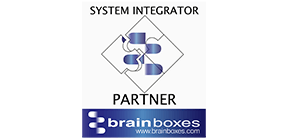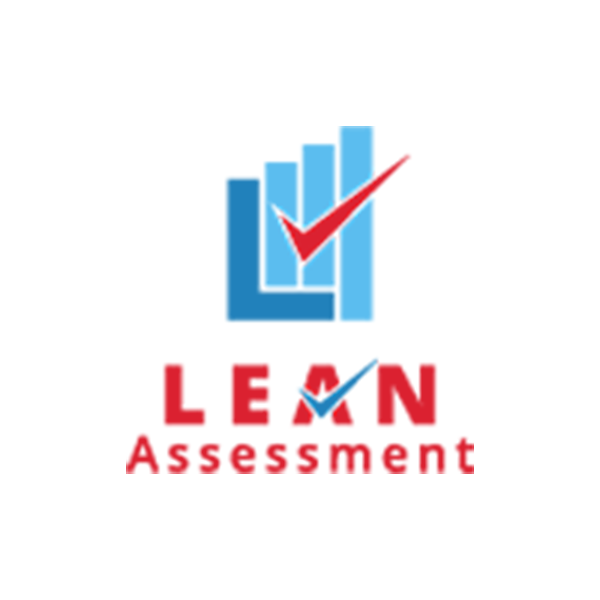
ILM Accredited Black Belt Training and Certification Program
- Six Sigma
- Black Belt
- Tools & Methodologies
- Mastering Performance
- Improve Standards
- Quality Improvement
- Gain Credibility
- Leadership
- Lean DMAIC Cycle

ILM Accredited Black Belt Training and Certification Program
- Six Sigma
- Black Belt
- Tools & Methodologies
- Mastering Performance
- Improve Standards
- Quality Improvement
- Gain Credibility
- Leadership
- Lean DMAIC Cycle

Six Sigma
- Tools and Techniques
- Training
- Different Skillsets
While those who hold a Green Belt or Black Belt often work closely together, they have distinctly different skill sets and roles on project teams. The primary focus of Six Sigma is on eliminating defects and variations from organisational processes. Education and training are key to the successful implementation of Six Sigma. Learning Six Sigma methodologies and applying it in the workspace has tremendous benefits for the future of any business.
- Proven Tools and Techniques
- High-Quality Products
- Eliminate Defects and Variations
- Education & Training
- Streamline Operations

Black Belt
- Improve Business Goals
- Handle Leadership
- Accomplish Process Improvement
This module deals with the introduction to concepts of Lean at a Black Belt Mentor level. Participants will be required to gain an understanding of the current Lean methodologies and sustainability in developing a long term lean enterprise structure. They will have a more thorough understanding of where and how to apply Six Sigma methodology to improve business goals. Black Belt professionals act as a change agent in transformational Six Sigma projects.
The focus of this module will be on the in-depth knowledge of Strategic Lean tools & techniques through industrial experience, practical application and benefits gained by the implementation of Lean.
- Module Size:Single
- Entry Requirements (prerequisites and corequisites): None Composition of module mark (including the weighting of components): 100% through presentation and open discussion
- In-depth Knowledge
- Lean Methodology
- Industrial Experience
- Practical Application
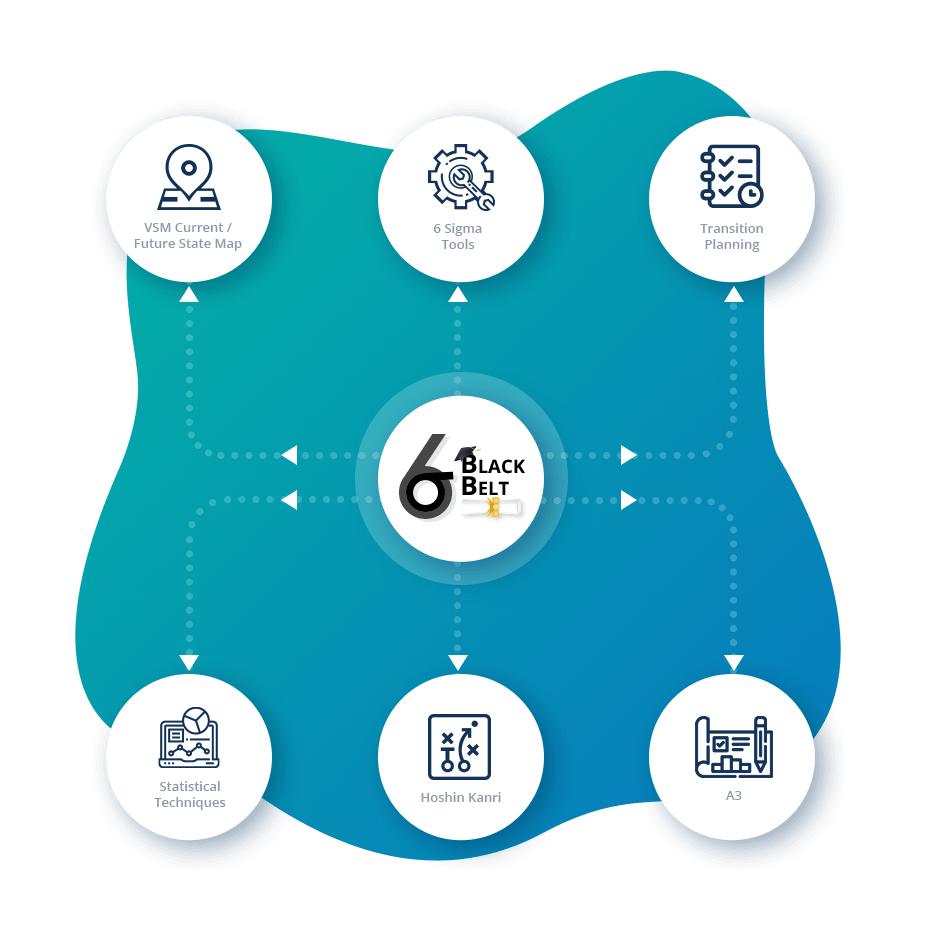
Tools and Methodologies Covered in Black Belt
- Root Cause
- Strategies
- DMAIC
- Effective Management
A comprehensive set of tools and methodologies are used to identify the root cause and solve problems within your organisation. These tools and methodologies also provide strategies to overcome the problem. It’s often deployed as part of the analysis phase in DMAIC.
- VSM Current / Future State Map
- 6 Sigma Tools
- Transition Planning
- Statistical Techniques
- Hoshin Kanri
- A3

Mastering Performance
- Improve Business Processes
- Increase Performance
- Reduce Defects
- Customer Satisfaction
With our Lean Six Sigma Black Belt Training, organisations will be able to improve their business processes. The tools provided during the training will increase performance and customer satisfaction which gives way to continuous process improvement with reduced defects. A Black Belt should be able to understand team dynamics and assign team member roles according to his or her skill level.
- Continuous Process Improvement
- Customer Satisfaction
- Increased Performance
- Reduced Defects
- Eliminate Errors
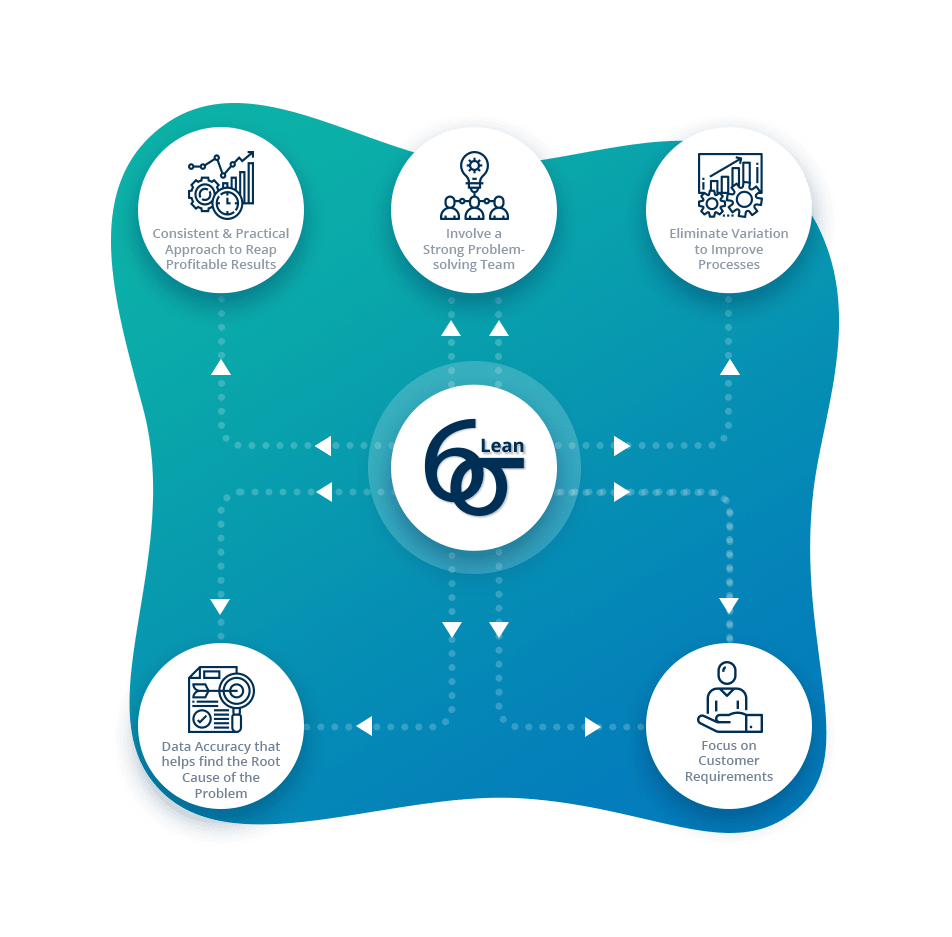
Improve Standards
- Enhance Standards
- Improve Working Conditions
- Remove Waste
- Continuous Improvement
Lean Six Sigma Black Belt training and certification program enhance standards within an organisation by improving working conditions, eliminating problems, and removing waste. Principles of Six Sigma find applications across a wide range of industries. The Six Sigma Black Belt Certification course allows individuals to perform factorial experiments, multiple regression, and describe the various types of process optimisation.
- Enhanced Standards
- Eliminate Problems
- Continuous Improvement
- Process Optimisation
- Remove Waste

Quality Improvement
- Maintain Quality
- Improve Quality
- Minimise Defects
- Monitoring
Both organisations and individuals can benefit from Lean Six Sigma’s quality management approach. It minimises/eliminates defects in products and services. Lean Six Sigma’s techniques enhance overall quality improvement. Identify and improve requirements in the project definition phase.
- Better Quality Management
- Effective Products and Services
- Improved Quality
- Effective Monitoring
- Corrective Measures

Gain Credibility
- Quality
- Customer Satisfaction
- Streamline Process
- Build Trust
Customers and stakeholders trust an organisation whose employees hold relevant qualifications. If your employees are Six Sigma certified, it means that their number one priority will be quality. A company that is quality driven is competitive and trustworthy, thus instils confidence in investors and partners. Six Sigma Green Belt can help streamline processes and increase customer satisfaction.
- Quality Driven
- Increase Customer Satisfaction
- Streamline Process
- Build Trust
- Prioritise Quality

Leadership
- Leadership
- Financial Management
- Training
- Strategic Plans
Enhance your leadership capabilities with Lean Six Sigma Certification. With the certification you are transformed into a change agent. Financial management and risk assessments are an integral part of leadership, and with the training you can support your organisation to eliminate errors. Black Belts oversee the work of Green Belts as they collect and analyse data. They mentor the Green Belt professionals on organizational improvement projects.
- Transform into a Change Agent
- Leadership Skills
- Risk Assessment
- Eliminate Error
- Mentor Green Belt Professionals
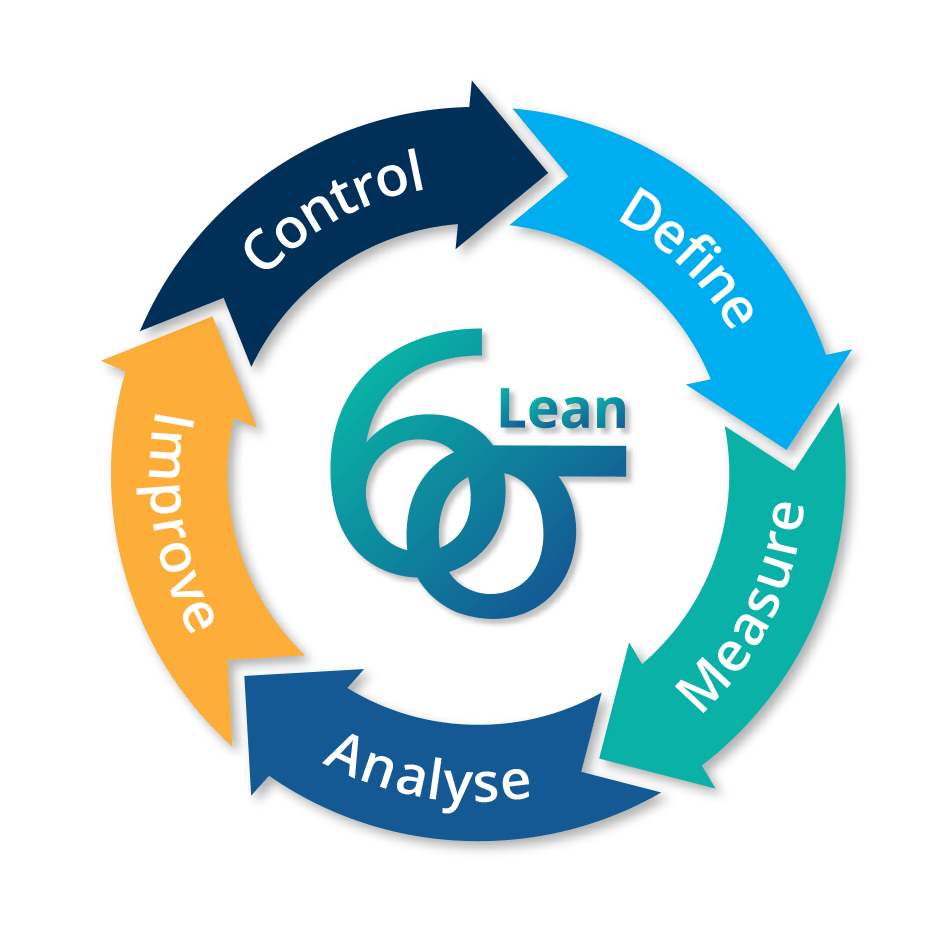
The Lean DMAIC Cycle
- Quality Improvement
- Lean
- Data Driven
Black Belts understand all aspects of the DMAIC methodology aligned to Six Sigma principles. Define, measure, analyse, improve, and control (DMAIC) is a data-driven quality strategy used to improve processes. It represents the five phases that make up the process, including the tools to use to complete those phases. It is an integral part of a Six Sigma initiative and can also be implemented as a quality improvement procedure or as part of other process improvement initiatives such as lean.
- Define the Problem
- Measure Process Performance
- Analyse the Root Cause
- Improve Process Performance by Eliminating the Root Cause
- Control and Assure that Improvements will Sustain
